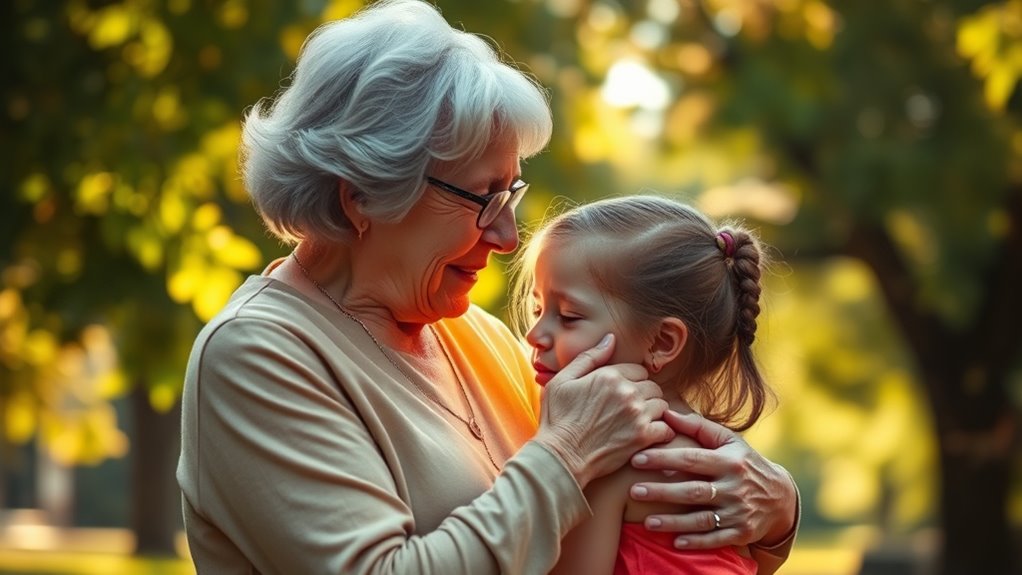The power of grace lies in your ability to show unconditional love even when it’s hard. It transforms lives by offering forgiveness, healing relationships, and fostering genuine connection. Grace involves consciously choosing compassion and understanding, which requires strength and emotional intelligence. When you extend kindness amid pain, you create ripples of hope and harmony. Embracing grace can bring peace to your life and others’. To discover how grace can truly change your world, explore these inspiring insights further.
Key Takeaways
- Grace transforms lives by offering forgiveness and hope, even in difficult circumstances.
- Extending unconditional love requires conscious effort to release resentment and choose understanding.
- Practicing forgiveness and compassion breaks down walls of hurt and fosters genuine connection.
- Responding with grace demonstrates strength, empathy, and promotes healing in relationships.
- Daily acts of grace create a ripple effect, inspiring others and nurturing peace, patience, and resilience.

Grace has the remarkable ability to transform lives, offering forgiveness and renewed hope in moments of weakness. When you choose to embrace grace, you open the door to healing in your relationships, even when it feels impossible to forgive. Forgiveness in relationships isn’t always easy; it often requires you to look beyond hurt and disappointment and instead extend compassion to someone who’s wronged you. It’s a conscious decision to release resentment and choose understanding over bitterness. By practicing forgiveness, you’re not excusing harmful actions but rather freeing yourself from their power to control your emotions. When you extend compassion, you acknowledge the pain but also see the person behind it. Showing grace means recognizing that everyone makes mistakes, including you, and offering a chance for redemption. This act of kindness can break down walls of hurt and foster genuine connection.
In difficult moments, it’s tempting to hold onto anger or withdraw, but grace calls you to respond differently. Instead of reacting with judgment or resentment, you actively choose to forgive, knowing that it’s a gift you give yourself as much as the other person. Extending compassion doesn’t mean ignoring boundaries or pain; it means approaching the situation with empathy and a desire for reconciliation. When you do this, you invite healing into the relationship, allowing both of you to grow from the experience. Grace isn’t about denying your feelings but about processing them in a way that promotes love and understanding. It’s an act of strength to forgive when every instinct might tell you to retaliate or shut down.
Understanding emotional intelligence can greatly enhance your ability to practice grace effectively in challenging situations. Your willingness to practice forgiveness in relationships can transform hostility into harmony, and resentment into peace. It’s a powerful act that reflects the very essence of grace—unconditional love in action. When you extend compassion, you’re not just helping others—you’re also nurturing your own soul. You learn patience, humility, and resilience. Over time, these acts of grace create a ripple effect, inspiring others to choose forgiveness and compassion in their own lives. Remember, grace is a choice you make every day. It’s not always easy, but its rewards—peace, connection, and renewed hope—are worth the effort. By embracing grace, you become a beacon of unconditional love, showing others what’s possible when kindness overcomes hurt.
Frequently Asked Questions
How Can I Practice Grace in Everyday Conflicts?
When facing everyday conflicts, you can practice grace by cultivating emotional resilience and choosing kindness in action. Remind yourself to stay calm, listen actively, and respond with understanding rather than anger. By showing patience and empathy, you foster a more compassionate environment. Practicing forgiveness and focusing on solutions helps you maintain grace even when situations are challenging. Over time, this approach transforms conflicts into opportunities for growth and stronger connections.
What Biblical Examples Demonstrate Unconditional Love?
You might think forgiving others is easy, but biblical examples show otherwise. Jesus’ love on the cross exemplifies unconditional love, forgiving even those who crucified Him. The story of the Prodigal Son highlights loving unconditionally, welcoming back a lost child despite mistakes. These stories remind you that grace isn’t about fairness but about choosing to love unconditionally, even when it’s the hardest thing to do.
How Do I Forgive Someone Who Hurt Me Deeply?
When you’re trying to forgive someone who hurt you deeply, start by forgiving yourself for any pain you feel. Recognize that healing takes time, and setting boundaries helps protect your emotional well-being. Focus on understanding their actions without excusing them, and choose to release bitterness. Remember, forgiveness is a process, not a one-time event—be patient with yourself as you work toward genuine peace and unconditional love.
What Are Common Obstacles to Extending Grace?
You might face forgiveness barriers like pride, which makes it hard to admit you’re hurt, or humility, which can feel like weakness. Sometimes, you cling to resentment because it shields you from vulnerability. Overcoming these obstacles requires a conscious effort to let go of ego and embrace grace. Recognizing that forgiveness isn’t about forgetting but releasing the pain helps you move past pride and humility, opening your heart to unconditional love.
Can Grace Transform Difficult Relationships Over Time?
Grace can truly transform difficult relationships over time by fostering mutual understanding and emotional resilience. When you choose to extend grace, you create space for healing and growth, allowing both parties to feel seen and valued. While it takes patience and effort, your consistent acts of kindness and forgiveness can break down barriers, encouraging trust and empathy. Over time, grace nurtures a deeper connection that withstands challenges, making relationships more resilient and meaningful.
Conclusion
Remember, showing grace isn’t always easy, but it’s the key to meaningful connection. When you choose to love unconditionally, even in tough moments, you embody the true spirit of compassion — much like a knight of old, standing firm in mercy. It’s your power to forgive, to understand, and to extend kindness that can transform wounds into healing. So, keep shining that light, and let grace be your guiding star through life’s most tempestuous seas.










